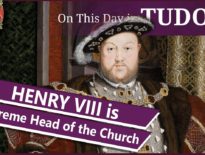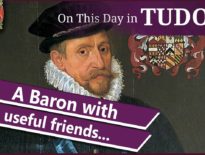On this day in history, 2nd November 1470, the feast of All Souls, King Edward V was born at Westminster Abbey, London. Young Edward was King of England for just 2 months in 1483 before he disappeared.
The events of his short life, his short reign and how it ended, are linked to the Tudors because Henry Tudor returned from exile to challenge King Richard III, who had, of course, taken the throne from Edward V.
Find out about Edward V's life and how he came to be one of the famous Princes in the Tower, in today's talk. I even share who I think was responsible for the deaths of the Princes in the Tower.
Also on this day in Tudor history, 2nd November 1541, Archbishop Thomas Cranmer gave King Henry VIII a letter that would spark off the beginning of the end for Queen Catherine Howard, Henry VIII's fifth wife. What was in this letter and how did it bring about this queen’s execution? Find out more in last year’s video:
Also on this day in history:
- 1581 – Death of Gilbert Berkeley, Bishop of Bath and Wells, at Wells. He was buried at the cathedral and his tomb chest can still be seen today, in the aisle of the north chancel.
Transcript:
On this day in history, 2nd November 1470, the feast of All Souls, King Edward V was born at Westminster Abbey, London. Little Edward was King of England for just 2 months.
Now I know that 1470 is not in the Tudor period and that Edward wasn’t a Tudor king, but his uncle, Richard III, taking the throne from him, is linked to the Tudors in that Henry Tudor decided to return from exile to challenge the throne of the man he viewed as an “odious tyrant” and usurper. Henry’s forces beat Richard’s at the Battle of Bosworth, Richard was killed and Henry became King Henry VII, the first Tudor king. Would we have ever had the Tudors on the English throne if Edward V’s reign had continued I wonder.
Let me tell you a bit more about Edward V’s short life…
• Edward was the eldest son of King Edward IV and his wife, Elizabeth Woodville.
• He was born at Cheyneygates, the Abbot of Westminster Abbey’s house, while his mother was in sanctuary there during his father’s exile and Henry VI’s restoration. He was baptised in the abbey with the abbot, prior, and Elizabeth, Lady Scrope, standing as his godparents.
• His father became king once more following the Battles of Barnet and Tewkesbury in 1471, and on 26th June 1471 little Edward was made Prince of Wales and Earl of Chester.
• John Alc*ck, bishop of Rochester, was appointed as his tutor and also the president of his council and his maternal uncle, Anthony Woodville, Earl Rivers, was made his governor.
• Edward was knighted in April 1475, made a Knight of the Garter in May 1475, and made keeper of the realm in June 1475, while his father was in France.
• Potential brides for the Prince of Wales included the Spanish Infanta Isabella, the daughter of the Duke of Milan, and Anne of Brittany. In 1481, Edward IV and François, Duke of Brittany, ratified a marriage treaty between Edward and Anne of Brittany.
• The prince’s council led by Edward as president of the Council of Wales and the Marches, was set up in Ludlow and Edward was at Ludlow Castle when news of his father’s death on 9th April 1483 reached him. Edward was on his way to London to prepare for his coronation when his uncle, Richard, Duke of Gloucester, stopped the party at Stony Stratford, arrested Edward’s half-brother, Richard Grey and his maternal uncle, Earl Rivers, and took custody of the prince. On hearing what had happened to Edward, Elizabeth Woodville went into sanctuary at Westminster once more with her daughters and her other son, Richard, Duke of York.
• After their arrival in London in May 1483, Richard was made protector for Edward and Edward went to the Tower to prepare for his coronation. He was joined there in June 1483 by his brother Richard after Cardinal Bourchier persuaded Elizabeth Woodville to surrender the prince.
• Later that month, a sermon was preached by Dr Ralph Shaw at St Paul’s Cross declaring that Edward IV had already been precontracted to marry Lady Eleanor Butler when he married Elizabeth Woodville, making that marriage invalid and their children illegitimate. Rivers and Grey were executed and Richard then took the throne as King Richard III. The princes were last seen in public at the Tower in June 1483.
• The fate of Edward and his brother, Richard, who have gone down in history as the Princes in the Tower, is not known and is still causing controversy today. Some believe that they were murdered on the orders of King Richard III, while others point the finger at other suspects, and still others believe that one or both of them may have been able to escape or go into exile. An excellent read on the survival theory is “The Survival of the Princes in the Tower” by Matthew Lewis.
• Henry VII during his reign had to deal with Pretender Perkin Warbeck who claimed to be Edward V’s brother, Richard, Duke of York. Warbeck’s invasion and rebellion failed and he was imprisoned and later executed.
Whenever I mention the Princes in the Tower, I always get asked what I think and today I’m going to lay my cards on the table. I don’t want to upset anyone, this is just my personal opinion based on my research and my reading of the situation… I believe that Edward and Richard were killed on the orders of Richard III. They were rival claimants and any monarch of that time would be sensible to remove rival claimants. Edward IV had done that with Henry VI, so Richard really wasn’t doing anything unusual in removing claimants, it’s just that we find it rather unsavoury because they were children and they were his nephews. Richard had to think of his future, the future of England and the future of his royal line.
But, we’ll never know, and that’s what makes this a great mystery! What do you think? I’d love to know.



I don’t believe Richard killed them, although it was possible and I don’t have any problem with people thinking he did, just with people who claim they can prove it either way, as it’s impossible. I don’t believe Richard had any motivation, not once they were legally made illegitimate. That might have changed later, however, depending on if he survived Bosworth, remarried and had more children. His only son and heir both died during his short reign. The same was true of Edward, Earl of Warwick, also legally barred from the throne, this time because his father was a traitor. I don’t think George of Clarence was any realistic threat, he just had a big mouth and was easily swayed by Warwick the Kingmaker to change sides. He usurped royal judicial authority and Edward iv had pardoned him twice, but he did go too far. His children, Edward and Margaret were very young and became royal wards. Richard didn’t see them as a threat, even though any rival King might be persuaded to reverse their Attaintment. Edward of Warwick attended Richard’s coronation. However, Henry Tudor saw the boy as a threat and when a conspiracy was hatched in his name, he was placed in the Tower. Henry later had him executed as he was dangerous by default. The Pretender Richard of England or Perkin Warbeck had escaped with Warwick to further his own cause and Henry bowed to International pressure to have them both tried and executed. Richard may well have had to do the same later on.
Richard didn’t produce any bodies. The safest thing to do if they were dead, if any rival was dead, as with Henry vi and Richard ii, was to put their bodies on public view, not bury them in secret. Richard, as with his brother controlled the narrative if he chose to, so could claim they died naturally. Plague was rife near the Tower during the hot Summer of 1483, so that’s a reasonable cover story. However, Richard didn’t produce them alive either, thus fuelling rumours about their fate. However, Richard wasn’t in London to produce them. He was in York. Should he have produced the boys? Possibly yes and no. However, the recorded sitings go on as late as September so maybe it wasn’t regarded as an actual problem. There was actually a good reason not to make too much fuss in 1483,_two attempts to spring them out of the Tower and the Buckingham rebelled, initially in their favour. Keeping them out of sight ensured his rivals were not given encouragement. A number of security measures were in place and one theory was that they were moved North because of security concerns. Buckingham may have kidnapped them so they were not available to parsde them around London and then killed them, he had his own claim. Richard had numerous reasons for not doing so, we can only guess at them, unfortunately. He had no beneficial reason at this time, although its possible their status might have changed in a more secure time. Again a dozen reasons and questions might arise here about why. None of this is useful as to their fate, however. Henry Vii paraded young Warwick out abd the next day John de la Pole started a rebellion which he claimed to be in his name. So his decision was no more wiser than that of Richard. Both had security concerns and it wasn’t always wise to have rivals of any age loose and in public view. Unfortunately, the rumours, probably spread by Buckingham, were fuelled after the boys vanished from public view, although no doubt someone knew what was going on.
You can have a number of candidates, including Richard, and a number of theories. Richard could have ordered it, so could Henry Vii or someone acting contrary to their wishes, its not impossible at all. However, its equally possible that neither died. The case for survival is just as interesting and has left as much of a trail as that of evidence that they died or were murdered. Unfortunately, it’s case not proven either way. It may always remain so. It’s a big mystery and it’s one which has polarised opinion for 500 plus years. Sources like Sir Thomas More and even the unreliable Manzini make good reading but they are completely inaccurate and full of holes. Other sources are more reliable but disagree on details, dates as well as candidates. Until proven otherwise, Richard for me is innocent, although I don’t discount the possibility, just that its not yet been proven.
Thanks for sharing your views, Claire, I had wondered. I don’t really have an opinion, I don’t know enough about the situation to have one. I’ve listened to Matthew Lewis and Nathan Amin, among others, numerous times, but I want to read Matthew Lewis Survival of the Princes in the Tower, and don’t have it yet. Thanks again! Michelle t